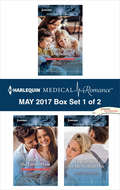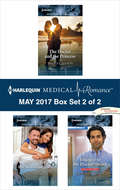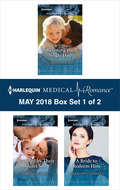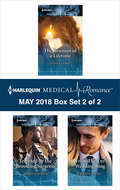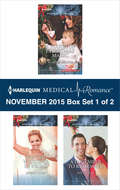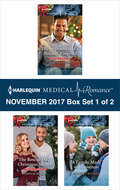- Table View
- List View
Harlequin Medical Romance March 2023 - Box Set 1 of 2: Romance March 2022 - Box Set 1 Of 2
by Alison Roberts Susan CarlisleHarlequin Medical Romance – March &‘23 – Box Set 1 of 2Harlequin Medical Romance brings you a collection of three new titles, available now! Enjoy these stories packed with pulse-racing romance and heart-racing medical drama.This Harlequin Medical Romance box set includes:SECRET SON TO CHANGE HIS LIFEMorgan Family MedicsBy Alison RobertsParamedic Jonno&’s memory of Brie is instantaneous when they meet again—and so is their mutual attraction. Brie can&’t disguise the excitement Jonno evokes in her, and now she can finally reveal what she&’s been longing to tell him – he has a son!HOW TO RESCUE THE HEART DOCTORMorgan Family MedicsBy Alison RobertsPediatric heart surgeon Anthony can&’t seem to mend his broken heart. Until he meets nurse Elsie and learns they share a grandson! Elsie welcomes Anthony&’s friendship and is delighted when it develops into more… But can she rescue his heart and heal her own too?REUNITED WITH THE CHILDREN&’S DOCAtlanta Children&’s Hospital By Susan CarlisleSince losing her son, Marcy&’s only focus is work. But unexpectedly meeting Dr Dylan again, his compassionate warmth invades the fortress around her heart. Dylan&’s been abandoned too many times, but an irresistible passion flares between them. Will they take a chance for a happy-ever-after…?
Harlequin Medical Romance March 2023 - Box Set 2 of 2: March 2022 - Box Set 2 Of 2
by Becky Wicks Charlotte Hawkes Fiona McArthurHarlequin Medical Romance – March &‘23 – Box Set 2 of 2Harlequin Medical Romance brings you a collection of three new titles, available now! Enjoy these stories packed with pulse-racing romance and heart-racing medical drama.This Harlequin Medical Romance box set includes:FATHER FOR THE MIDWIFE&’S TWINSBy Fiona McArthurMidwife Lisandra is trapped in an elevator with obstetrician Malachi as her waters break. Having recently lost everything, Malachi offers her and her babies a temporary place to stay. But when a spark ignites between them, could her rescuer also become a father for her twins?HIGHLAND FLING WITH HER BEST FRIENDBy Becky WicksAfter a bad breakup, Dr Sadie is offered a new job in Scotland with her best friend. It sounds like the perfect escape! But Sadie&’s never worked with Dr Owen before, and suddenly she wants to shove him out of the friendzone—straight into her bed!NEUROSURGEON, SINGLE DAD…HUSBAND?By Charlotte HawkesWhen neurosurgeon Seth becomes the guardian of his nephew Noah, he has no idea what he&’s doing! Noah hasn&’t spoken since his sister&’s passing, so when nurse Andrea gets him to speak, Seth enlists her help. Could she be the bright future this fledgling family deserves?
Harlequin Medical Romance March 2024 – Box Set 1 of 2
by Carol Marinelli Fiona McArthur Kristine LynnHarlequin Medical Romance brings you a collection of three new titles, available now! Enjoy these stories packed with pulse-racing romance and heart-racing medical drama.This Harlequin Medical Romance box set includes:ONE MONTH TO TAME THE SURGEONBy Carol MarinelliNurse Pippa is shocked when charismatic surgeon—and her secret teenage crush—Luke starts working at her hospital. Their chemistry ignites instantly, and is completely inescapable! But Luke is only in London for a month, unless Pippa can tame the man who&’s barricaded his emotions for so long…HEALING THE BABY DOC&’S HEARTBy Fiona McArthurNurse Isabella&’s new role on the NICU quickly leads her to cross swords with guarded, handsome neonatal doc Simon! He&’s the exact type she should avoid. Until Isabella sees behind this widower&’s walls to a heart that needs healing… Could they be each other&’s chance for a happy future?ACCIDENTALLY DATING HIS BOSS By Kristine LynnPlastic surgeon Dr. Owen is not happy with his infuriatingly stunning new boss, Dr. Kris&’s ideas. Thankfully, he has his anonymous virtual friend @ladydoc to vent to. Yet, when Owen discovers the unthinkable—that Kris is his cyber crush!—is he brave enough to bring their accidental connection offline?
Harlequin Medical Romance March 2024 – Box Set 2 of 2
by Amy Ruttan Karin Baine Kate MacGuireHarlequin Medical Romance brings you a collection of three new titles, available now! Enjoy these stories packed with pulse-racing romance and heart-racing medical drama.This Harlequin Medical Romance box set includes:AN AMERICAN DOCTOR IN IRELANDBy Karin BaineAmerican doctor Mae moved to Dublin to escape her recent heartbreak. The last thing on her mind is romance… So why can&’t she resist her sexy colleague, Dr. Liam? He&’s a single dad with baggage of his own! Will a passionate fling give them the confidence to move forward—together?TEMPTED BY THE SINGLE DAD NEXT DOORBy Amy RuttanJilted vet tech Harley has sworn off relationships. But meeting her new tenant, vet and gorgeous single dad Ryker, tempts her for the first time in years… He&’s only here temporarily, so Harley can&’t get attached. Yet, giving into their desires seems both inevitable and dangerous to her heart…RESISTING THE OFF-LIMITS PEDIATRICIANBy Kate MacGuireDr. Charlotte&’s latest assignment in a clinic for homeless teens seems different. Maybe it&’s the attraction she feels for her colleague, pediatrician John! But he&’s got his hands full as guardian to his niece, so she puts him firmly off-limits. Except their spark is just too powerful to resist!
Harlequin Medical Romance March 2025 - Box Set 1 of 2
by Annie Claydon Louisa HeatonHarlequin Medical Romance – March &‘25 – Box Set 1 of 2Harlequin Medical Romance brings you a collection of three new titles, available now! Enjoy these stories packed with pulse-racing romance and heart-racing medical drama.This Harlequin Medical Romance box set includes:BEST FRIEND TO HUSBAND?By Louisa HeatonGP Lorna has spent years healing from a divorce and the end of her fertility journey by throwing herself into her work at Clearbrook Medical Practice. But when Oliver—her onetime best friend and secret crush—takes a job as a doctor at her surgery, life suddenly becomes more complicated! After the breakdown of his difficult marriage, Oliver isn&’t looking for romance, either. Yet old feelings soon begin to resurge. Can they risk their friendship in the hope of something more?FINDING A FAMILY NEXT DOORBy Louisa HeatonGP Bella Nightingale needs a fresh start for herself and her little boy in the wake of a cheating ex. On her first day at Clearbrook Medical Practice, she discovers that her gorgeous colleague Dr. Max Moore is also a single parent—and her new neighbor! No stranger to loss, Max is as afraid of being hurt again as Bella, but the attraction between them is undeniable… Should they play it safe and avoid heartache, or could two and two make a perfect family of four?THE GP&’S SEASIDE REUNIONBy Annie ClaydonDr. Hope wants to spread her wings beyond her seaside hometown and live life to the fullest now that her caring years are behind her. Only, she wasn&’t expecting the new locum at her practice to be Theo, her med school mentor and the man she once adored. Now their chemistry is both powerful and mutual, but unlike Hope, Theo&’s traveled the world and longs to put down roots. With their dreams diametrically opposed, is this just another way to say goodbye or the chance at forever they never had?
Harlequin Medical Romance March 2025 - Box Set 2 of 2
by Charlotte Hawkes Kristine Lynn Zoey GomezHarlequin Medical Romance – March &‘25 – Box Set 2 of 2Harlequin Medical Romance brings you a collection of three new titles, available now! Enjoy these stories packed with pulse-racing romance and heart-racing medical drama.This Harlequin Medical Romance box set includes:A KISS WITH THE IRISH SURGEONBy Kristine LynnSurgeon Sorcha is devastated when Patrick is given the chief of surgery position at Boston General that she&’s worked her whole career for. Especially as she&’s always resented him for whisking his late wife—her best friend—away to Ireland just when Sorcha needed her most! Still, if Sorcha is to get the green light on the clinical trial that means everything to her, she must work with Patrick. Which leads her to discover that this single dad is a lot more lovable than she ever imagined…NURSE&’S BABY BOMBSHELLBy Charlotte HawkesSleeping with surgeon Ivan was always meant to be a one-off for nurse Ruby. Making love was a temporary balm for their troubled souls. But now Ruby is pregnant! And while both of them had difficult upbringings, she&’s excited to be a mom, yet the last thing Ivan wants is to be a father. Once the shock wears off, though, Ivan&’s taken aback by the strength of his feelings for Ruby. He&’d thought he was not cut out to be a dad, but with Ruby by his side, he&’s starting to believe anything is possible…THE SINGLE DAD&’S SECRETBy Zoey GomezCity doc Dean&’s singleton lifestyle shuddered to a halt when his best friend died, leaving him legal guardian of her six-year-old son. Now Dean seeks help in the small village where Rafael&’s unknowing biological father lives… Introverted Dr. Lucien is horrified to learn he&’ll share the sanctuary of the doctors&’ residence with infuriatingly attractive Dean and his young son. Though he tries to keep Dean at arm&’s length, their simmering sensual tension becomes impossible to ignore—as does his fondness for Rafael… But why does he get the feeling Dean is holding something back?
Harlequin Medical Romance May 2017 - Box Set 1 of 2: Mommy, Nurse...Duchess?\Falling for the Foster Mom\English Rose for the Sicilian Doc
by Kate Hardy Annie Claydon Karin BaineHarlequin® Medical Romance brings you a collection of three new titles, available now! Enjoy these stories packed with pulse-racing romance and heart-racing medical drama. This Harlequin Medical Romance box set includes: MOMMY, NURSE…DUCHESS?Paddington Children's Hospitalby Kate HardyItalian duke Dr. Leo Marchetti leaves Rosie Hobbes breathless. Can he prove he'd make the best husband and father—ever? FALLING FOR THE FOSTER MOMPaddington Children's Hospitalby Karin BaineQuinn Grady is uber-protective of her foster son. But she might find Dr. Matthew McGrory is the hero they've both dreamed of… ENGLISH ROSE FOR THE SICILIAN DOC by Annie ClaydonSingle mother Rose Palmer wonders if she's finally found a man she can trust in Dr. Matteo Di Salvo…with her heart and her son. Join HarlequinMyRewards.com to earn FREE books and more. Earn points for all your Harlequin purchases from wherever you shop.
Harlequin Medical Romance May 2017 - Box Set 2 of 2: The Doctor and the Princess\Miracle for the Neurosurgeon\Engaged to the Doctor Sheikh
by Meredith Webber Lynne Marshall Scarlet WilsonHarlequin® Medical Romance brings you a collection of three new titles, available now! Enjoy these stories packed with pulse-racing romance and heart-racing medical drama. This Harlequin Medical Romance box set includes: THE DOCTOR AND THE PRINCESSby Scarlet WilsonTheir chemistry is undeniable! But will Sullivan Darcy follow his heart when doctor princess Gabrielle Cartier must return home to rule? MIRACLE FOR THE NEUROSURGEONby Lynne MarshallDare neurosurgeon Wes Van Allen hope for the ultimate miracle…a family, with Mary Harris—his never-forgotten flame—by his side? ENGAGED TO THE DOCTOR SHEIKH The Halliday Familyby Meredith WebberWhen Lila Halliday causes uproar in his desert kingdom, Sheikh Tariq al Askeba issues an ultimatum: leave…or become his desert bride! Join HarlequinMyRewards.com to earn FREE books and more. Earn points for all your Harlequin purchases from wherever you shop.
Harlequin Medical Romance May 2018 - Box Set 1 of 2: Resisting the Single Dad\Reunited by Their Secret Son\A Bride to Redeem Him
by Scarlet Wilson Louisa George Charlotte HawkesHarlequin Medical Romance brings you a collection of three new titles, available now! Enjoy these stories packed with pulse-racing romance and heart-racing medical drama.This Harlequin Medical Romance box set includes:RESISTING THE SINGLE DADby Scarlet WilsonCordelia Greenway usually avoids reminders of the family she’ll never have, but devoted dad Dr. Gene Du Bois is weakening all her defenses…REUNITED BY THEIR SECRET SONby Louisa GeorgeSingle mom Sophie can never forget her sizzling encounter with gorgeous stranger Finn—and now she’s come face-to-face with him again!A BRIDE TO REDEEM HIMby Charlotte HawkesIf he’s to redeem himself, world-renowned surgeon and playboy Louis Delaroche only has one choice— make Alex Vardy his bride!Join HarlequinMyRewards.com to earn FREE books and more. Earn points for all your Harlequin purchases from wherever you shop.
Harlequin Medical Romance May 2018 - Box Set 2 of 2: The Reunion of a Lifetime\Tempted by the Brooding Surgeon\From Fling to Wedding Ring
by Fiona Lowe Robin Gianna Karin BaineHarlequin Medical Romance brings you a collection of three new titles, available now! Enjoy these stories packed with pulse-racing romance and heart-racing medical drama.This Harlequin Medical Romance box set includes:THE REUNION OF A LIFETIMEby Fiona LoweGP Lauren Fuller hasn’t seen Charlie Ainsworth in twelve years… But now he’s back, is it too late for happy-ever-after?TEMPTED BY THE BROODING SURGEONby Robin GiannaWhen Annabelle Richards learns surgeon Daniel Ferrera’s brooding exterior hides a wealth of pain, can she resist the unexpected desire that ignites?FROM FLING TO WEDDING RINGby Karin BaineNurse Mollie Forrester finds passion in sexy surgeon Ben Sheridan’s arms—but can he persuade her she’s worthy of love?Join HarlequinMyRewards.com to earn FREE books and more. Earn points for all your Harlequin purchases from wherever you shop.
Harlequin Medical Romance May 2019 - Box Set 1 of 2
by Scarlet Wilson Traci Douglass Amy RuttanHarlequin Medical Romance brings you a collection of three new titles, available now! Enjoy these stories packed with pulse-racing romance and heart-racing medical drama.This Harlequin Medical Romance box set includes:TEMPTED BY THE HOT HIGHLAND DOCby Scarlet WilsonTV presenter Kristie Nelson is just as tempted off camera by irrepressible doc Rhuaridh Gillespie as she is when they’re in the spotlight…THE SURGEON’S CONVENIENT HUSBANDby Amy RuttanArmy doc Aran’s military service has kept him apart from convenient wife Dr. Ruby… But now he’s back, more tempting than ever!FINDING HER FOREVER FAMILYby Traci DouglassGrowing closer to sexy single dad Dr. Tom Faber awakens trauma nurse Wendy Smith’s longing for a family—with him!
Harlequin Medical Romance May 2019 - Box Set 2 of 2: An Anthology
by Susan Carlisle Amalie Berlin Susanne HamptonHarlequin Medical Romance brings you a collection of three new titles, available now! Enjoy these stories packed with pulse-racing romance and heart-racing medical drama.This Harlequin Medical Romance box set includes:THE SHEIKH DOC’S MARRIAGE BARGAINby Susan CarlisleSheikh Tariq is determined to protect Dr. Laurel from the scandal of her presence in his palace—with a very convenient proposal! MENDING THE SINGLE DAD’S HEARTby Susanne HamptonIs dashing single dad Dr. Harrison Wainwright the man that independent locum doc Jessica Ayers never knew she needed?RESCUED BY HER RIVALby Amalie BerlinA wildfire forces elite firefighters Lauren and Beck to work together, but it’s their flaming attraction they’re desperately trying to extinguish.
Harlequin Medical Romance May 2020 - Box Set 1 of 2
by Carol Marinelli Amy Ruttan Juliette HylandHarlequin Medical Romance brings you a collection of three new titles, available now! Enjoy these stories packed with pulse-racing romance and heart-racing medical drama.This Harlequin Medical Romance box set includes:THE NURSE’S REUNION WISHby Carol MarinelliEmergency nurse Rachel hasn’t seen doctor Dominic since the tragic breakdown of their shotgun marriage…until he walks into her hospital.BABY BOMBSHELL FOR THE DOCTOR PRINCEby Amy RuttanSecret prince Dr. Lev Vanin’s world is rocked upon beginning his new job. His new colleague is Imogen Hayes…and she’s carrying his heir!THEIR HOT HAWAIIAN FLINGby Traci DouglassDr. Leilani Kim’s dream job is finally in sight…but she has competition in scarred yet sexy trauma surgeon Holden Ross!
Harlequin Medical Romance May 2020 - Box Set 2 of 2
by Traci Douglass Charlotte Hawkes Ann McIntoshHarlequin Medical Romance brings you a collection of three new titles, available now! Enjoy these stories packed with pulse-racing romance and heart-racing medical drama.This Harlequin Medical Romance box set includes:AWAKENED BY THE BROODING BRAZILIANA Summer in S‹o Pauloby Ann McIntoshDr. Krysta’s determination to use her temporary hospital placement to reset her priorities leaves one important question: Will surgeon Francisco show her a never-experienced pleasure?FALLING FOR THE SINGLE DAD SURGEONA Summer in S‹o Pauloby Charlotte HawkesSurgeon Jake’s summer in Brazil was meant to help him connect with his orphaned nephew. It’s also inspired an attraction to medical researcher Flavia… UNLOCKING THE EX-ARMY DOC’S HEARTby Juliette HylandFormer army doc Annie Masters uses her work as a safe haven. Dynamic celebrity surgeon Rafe is determined to show her what she missing…
Harlequin Medical Romance May 2021 - Box Set 1 of 2
by Scarlet Wilson Annie O'Neil Deanne AndersHarlequin Medical Romance brings you a collection of three new titles, available now! Enjoy these stories packed with pulse-racing romance and heart-racing medical drama. This Harlequin Medical Romance box set includes: A FAMILY MADE IN ROMEDouble Miracle at St Nicolino&’s HospitalBy Annie O&’Neil When Leon faces performing pioneering surgery on conjoined twins, he knows his ex, Lizzy, is the person to join him. Lizzy can&’t refuse, but first she must share her own baby bombshell! REAWAKENED BY THE ITALIAN SURGEON Double Miracle at St Nicolino&’s HospitalBy Scarlet Wilson Flying to Rome to separate conjoined twins is just the fresh start that Autumn needs. Until lead surgeon, widowed Giovanni Lombardi and his adorable daughter awakens all her hidden longings… THE NEUROSURGEON&’S UNEXPECTED FAMILY By Deanne Anders William&’s eleven-month old half-sister has been placed into his care – and he has to figure out, how to be a surrogate father, quick! Fortunately, an adorable, wonderful nurse, Hannah, offers to help…
Harlequin Medical Romance May 2021 - Box Set 2 of 2
by Alison Roberts Louisa George Allie KincheloeHarlequin Medical Romance brings you a collection of three new titles, available now! Enjoy these stories packed with pulse-racing romance and heart-racing medical drama. This Harlequin Medical Romance box set includes: UNLOCKING THE REBEL&’S HEARTBy Alison Roberts It&’s no secret that settling down is off paramedic Benjamin&’s agenda. Yet when locum doctor Joy literally crashes into his life, the attraction between them is electric. Can they ignore growing temptation?NURSE&’S ONE-NIGHT BABY SURPRISEBy Louisa George Fraser is the last man nurse Briana should be attracted to - she&’s kept her feelings for him under wraps for years. But when he moves to her village, she knows she&’s in trouble…REUNITED WITH DOCTOR DEVEREAUX By Allie Kincheloe Years ago, surgeon Danny broke GP Camilla Deveraux&’s heart. Now, Danny is back. Can they leave the past behind and embrace the bright future they deserve…together?
Harlequin Medical Romance May 2024 - Box Set 1 of 2
by Annie Claydon Juliette HylandHarlequin Medical Romance brings you a collection of three new titles, available now! Enjoy these stories packed with pulse-racing romance and heart-racing medical drama.This Harlequin Medical Romance box set includes:DATING HIS IRRESISTIBLE RIVALHope Hospital SurgeonsBy Juliette HylandFoster care survivor Knox has worked hard to be the best trauma surgeon. Yet it still stings that in med school annoyingly irresistible Miranda beat him to a coveted fellowship. Now that Miranda&’s returned, it&’s clear the remarkable woman he knew is a shadow of her former self. Putting his competitiveness aside, Knox is determined to bring her fire back. Could a first date to rival all first dates be the answer?HER SECRET BABY CONFESSIONHope Hospital SurgeonsBy Juliette HylandLet me "introduce you to your daughter&” are not words responsible surgeon Ryann ever thought she&’d say. Yet here she is, face-to-face with the man she spent one incredible, and totally out of character, week with, confessing she&’s had his baby! Despite growing up in the foster system, nurse anesthetist Jackson is thrilled to be a dad. But can they be more than co-parents when cautious Ryann so ardently protects her carefully curated life…?COUNTRY FLING WITH THE CITY SURGEON By Annie ClaydonStella and Rob are nothing alike. She&’s an ambitious reconstructive surgeon from the city, while he&’s a dedicated country GP. But when they pair up on a complicated case, they discover they make the perfect team. Stella awakens a deeply buried spark in Rob, and he tempts her to let her guard down. They decide to work together on something more intimate—a fling! Because two people who are so different couldn&’t have anything other than that…right?
Harlequin Medical Romance May 2024 - Box Set 2 of 2
by Marion Lennox Tina Beckett Susan CarlisleHarlequin Medical Romance brings you a collection of three new titles, available now! Enjoy these stories packed with pulse-racing romance and heart-racing medical drama.This Harlequin Medical Romance box set includes:TEMPTING THE OFF-LIMITS NURSEBy Tina BeckettNew nurse in town Eliana can&’t bear to be hurt by somebody again. So when sparks instantly fly with surgeon Jake, she&’s adamant about keeping their relationship purely professional. But after learning how Jake was betrayed by his ex-girlfriend, she knows he won&’t commit to a lasting connection either. Soon it&’s oh so tempting to give in to their mutual attraction…as long as forever remains firmly off-limits!THE DOCTOR&’S BILLION-DOLLAR BRIDEBy Marion LennoxForced into a convenient union to claim a lifesaving billion-dollar legacy, ophthalmologist Seb and GP Jodie agree their marriage will begin and end with their wedding! Neither believes in happily-ever-after—how can they when life has taught them such tough lessons? But once they start living together, it&’s impossible to keep their barriers in place. And an unexpected passion is quickly unleashed! Dare this fake bride…become a real wife?FALLING FOR THE TRAUMA DOCKentucky Derby MedicsBy Susan CarlisleCallee needs to move on from a huge loss, and the way to do that is to armor plate her heart. So when trauma doc Langston arrives at her clinic to temporarily conduct research, she knows she&’s in trouble. Not only is he helpful with patients, but their chemistry is electric! Is Langston the guy to take a leap with, when he isn&’t planning to stick around?
Harlequin Medical Romance May 2025 - Box Set 1 of 2
by Alison Roberts Traci Douglass Kristine LynnHarlequin Medical Romance – May &‘25 – Box Set 1 of 2Harlequin Medical Romance brings you a collection of three new titles, available now! Enjoy these stories packed with pulse-racing romance and heart-racing medical drama.This Harlequin Medical Romance box set includes:MIDWIFE&’S THREE-DATE RULEBy Alison RobertsMidwife Pippa has sworn off romance. She tried the marriage-and-children path once, and it was devastating. So she&’s stunned by the ferocity of her attraction to the head of department, Lachlan! And as they bond over their mutual avoidance of commitment, the flames between them only burn brighter. Giving birth to the &“three-date rule&”! Three dates, no expectations—then they return to being friends and coworkers. But you know what they say about best-laid plans… Because it&’s soon clear that Pippa and Lachlan&’s chemistry threatens to tempt them into breaking their relationship rules…A SINGLE DAD TO HEAL HIMBy Traci DouglassDr. Devon&’s life has been a hot mess lately. And love is absolutely not in the cards after his painful divorce. So his move to Minnesota should be a chance to refresh. Instead, Devon comes face-to-face with his past when single dad Val is introduced as his colleague. Once best friends, they haven&’t talked in years… But Devon&’s attempts to keep his distance abruptly end when Val&’s little boy is rushed to the hospital. The two quickly find refuge in their undeniable bond. Still, Devon can&’t let himself dream of being a permanent part of Val&’s world…can he?NINE MONTHS TO MARRY THE PRINCESSBy Kristine LynnPrincess Emilia de Reyes can&’t wait to train incognito at Minneapolis General Hospital and live an &“ordinary&” life. On her first night, she finds freedom in the arms of a gorgeous stranger—only to learn the next day that he&’s actually Dr. Aiodhán O&’Hara, the chief of general surgery…and her new boss! What&’s more, Emilia&’s about to discover that she&’s pregnant with their child! Emilia has been burned by a failed marriage of convenience before and Aiodhán doesn&’t do relationships, but could a royal wedding lead to happily-ever-after?
Harlequin Medical Romance May 2025 - Box Set 2 of 2
by Scarlet Wilson Louisa Heaton Kate MacGuireHarlequin Medical Romance – May &‘25 – Box Set 2 of 2Harlequin Medical Romance brings you a collection of three new titles, available now! Enjoy these stories packed with pulse-racing romance and heart-racing medical drama.This Harlequin Medical Romance box set includes:NURSE&’S DUBAI TEMPTATIONBy Scarlet WilsonNurse Addy wants to forget all about her ex-fiancé. And the opportunity to relocate to Dubai for a new job provides her with just the space she needs. Until Dr. Theo complicates Addy&’s fresh start… Because her plan did not include catching—inconvenient!—feelings for her handsome colleague. Especially when single dad Theo comes as a package deal with his adorable adopted son. But when Addy learns that Theo&’s her neighbor, pretending that sparks aren&’t flying between them becomes even harder. Still, is she ready to risk her heart on this family?THE SURGEON&’S RELATIONSHIP RUSE By Louisa HeatonSurgeon Anthony Fitzpatrick, Duke of Weston, is expecting a normal day on the orthopedic ward when he meets nurse Julia. He immediately recognizes her as the woman whose baby he unexpectedly delivered a decade ago! Since then, tragedy has devastated both their lives and left them guarded. Yet Julia still longs to repay Anthony for his kindness. So when he needs a fake relationship to appease his family&’s meddling, she steps up! But as their ruse unveils an all-too-real connection, can their two broken hearts heal as one?CITY DOC FOR THE SINGLE MOMBy Kate MacGuireTwin Creeks has been Lily&’s safe haven since the heartbreaking loss of her husband. Shocked into quitting her high-octane job as a flight trauma nurse, for the past five years she&’s focused on raising and protecting her daughter, Alexa. Until committed bachelor Dr. Joe arrives. He&’s good-looking, impulsive and so charming that he persuades Lily to take up nursing again. She shouldn&’t be tempted—he&’s not planning on staying, and she senses he&’s holding something back! Yet she sees his growing affection for the town, Alexa and her—and he&’s making her feel alive again…
Harlequin Medical Romance November 2015 - Box Set 1 of 2
by Janice Lynn Sue Mackay Scarlet WilsonHarlequin® Medical Romance brings you three new titles at a great value, available now! Enjoy these stories packed with pulse-racing romance and heart-racing medical drama. This Harlequin® Medical Romance box set includes: A TOUCH OF CHRISTMAS MAGIC Midwives On-Call at Christmas by Scarlet Wilson Pretty midwife Bonnie is only staying for Christmas...but can brooding obstetrician Jacob Layton ever let her go? WINTER WEDDING IN VEGAS by Janice Lynn Single mom Taylor wakes up in Vegas with Dr. Slade Sain next to her--and a ring on her finger... A DECEMBER TO REMEMBER by Sue MacKay One unforgettable Christmas kiss with sinfully seductive Dr. Luca Chirsky has Ellie dreaming of her happily-ever-after! Look for six new captivating love stories every month from Harlequin® Medical Romance!
Harlequin Medical Romance November 2015 - Box Set 2 of 2
by Susan Carlisle Robin Gianna Louisa HeatonHarlequin® Medical Romance brings you three new titles at a great value, available now! Enjoy these stories packed with pulse-racing romance and heart-racing medical drama. This Harlequin® Medical Romance box set includes: HER CHRISTMAS BABY BUMP Midwives On-Call at Christmas by Robin Gianna Dr. Aaron Cartwright's mistletoe kisses were dazzling, but midwife Hope never expected to end up pregnant...after just one night! ONE NIGHT BEFORE CHRISTMAS by Susan Carlisle After their short, steamy time together, Melanie's falling for hotshot doc Dalton Reynolds...can she convince him to stay? A FATHER THIS CHRISTMAS? by Louisa Heaton Now that delicious Dr. Jacob Dolan is back, Eva must reveal her three-year-old secret--their adorable son, Seb! Look for six new captivating love stories every month from Harlequin® Medical Romance!
Harlequin Medical Romance November 2016 - Box Set 1 of 2: The Nurse's Christmas Gift\Their First Family Christmas\It Started at Christmas...
by Alison Roberts Janice Lynn Tina BeckettHarlequin® Medical Romance brings you a collection of three new titles, available now! Enjoy these stories packed with pulse-racing romance and heart-racing medical drama. This Harlequin Medical Romance box set includes: THE NURSE'S CHRISTMAS GIFTChristmas Miracles in Maternity by Tina Beckett Can a miracle in Maternity reunite pediatrician Max Ainsley and his estranged wife, Annabelle Brookes, in time for Christmas? THEIR FIRST FAMILY CHRISTMASChristmas Eve Magic by Alison Roberts With Jack Reynolds's Christmas Eve return, Dr. Emma Matthews and little Lily might get the perfect family Christmas... IT STARTED AT CHRISTMAS... by Janice LynnMcKenzie Sanders and Lance Spencer indulge in a sizzling fling...but what happens when risking their hearts leads to wedding bells? Join HarlequinMyRewards.com to earn FREE books and more. Earn points for all your Harlequin purchases from wherever you shop.
Harlequin Medical Romance November 2016 - Box Set 2 of 2: The Midwife's Pregnancy Miracle\The Nightshift Before Christmas\Unwrapped by the Duke
by Kate Hardy Amy Ruttan Annie O'NeilHarlequin® Medical Romance brings you a collection of three new titles, available now! Enjoy these stories packed with pulse-racing romance and heart-racing medical drama. This Harlequin Medical Romance box set includes: THE MIDWIFE'S PREGNANCY MIRACLEChristmas Miracles in Maternity by Kate Hardy After one night of passion, could Ella O'Brien and Oliver Darrington's Christmas surprise make them a family? THE NIGHTSHIFT BEFORE CHRISTMASChristmas Eve Magic by Annie O'Neil Josh West is determined to heal Dr. Kate McGann's heart...one kiss under the mistletoe at a time! UNWRAPPED BY THE DUKE by Amy RuttanThomas Ashwood's every burning look makes Geri Collins contemplate the consequences of a kiss under the mistletoe... Join HarlequinMyRewards.com to earn FREE books and more. Earn points for all your Harlequin purchases from wherever you shop.
Harlequin Medical Romance November 2017 - Box Set 1 of 2: The Spanish Duke's Holiday Proposal\The Rescue Doc's Christmas Miracle\A Family Made at Christmas
by Scarlet Wilson Amalie Berlin Robin GiannaHarlequin® Medical Romance brings you a collection of three new titles, available now! Enjoy these stories packed with pulse-racing romance and heart-racing medical drama. This Harlequin Medical Romance box set includes: THE SPANISH DUKE'S HOLIDAY PROPOSALChristmas in Manhattanby Robin Gianna Aristocratic paramedic Mateo Alves needs a temporary fiancée, but when Christmas is over, will he be able to let Dr. Miranda Davenport go? THE RESCUE DOC'S CHRISTMAS MIRACLEChristmas in Manhattanby Amalie Berlin Daredevil air ambulance paramedic Penny Davenport must tell her cautious partner, Dr. Gabriel Jackson, she's pregnant—with his child! A FAMILY MADE AT CHRISTMAS by Scarlet Wilson When gorgeous army doc Riley Callaghan discovers he has a son, physiotherapist April Henderson gets a glimpse of the family and Christmas she longs for… Join HarlequinMyRewards.com to earn FREE books and more. Earn points for all your Harlequin purchases from wherever you shop.






